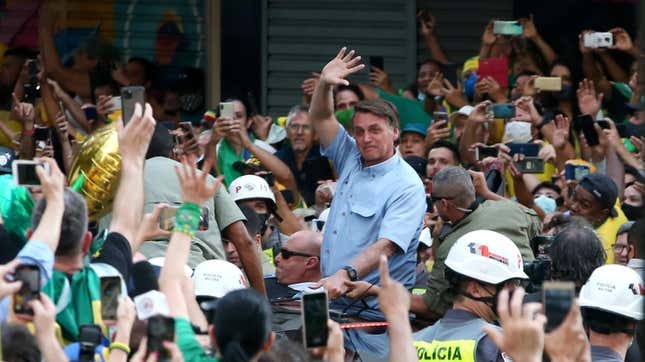
Jair Bolsonaro, the fascist Keebler elf who unfortunately remains president of Brazil, is now ordering social media platforms not to delete certain content including his fantastical assertions that he can only lose next year’s elections due to fraud.
Many right-wingers in the U.S. and abroad have long been obsessed with a conspiracy theory that left-wing internet companies are colluding to silence them—if anything, the body of evidence shows it’s the complete and total opposite—and their response has generally been to propose kneecapping those companies’ abilities to moderate content. Bolsonaro, a far-right demagogue whose platform is largely based on racism, misogyny, and naked exhortations towards violence, has used sites like Facebook, Twitter, and YouTube as a megaphone to amplify his claims that the only thing that can interfere with his preordained victory next year is mass voter fraud. He has also said the only possible outcomes for him will be getting “arrested, killed or victory.” The new rules applying to social media sites are obviously designed to prevent them from finally getting sick of his malignant behavior and making any moves to limit his reach, as happened to Donald Trump in the last stages of his presidency.
According to the New York Times, Bolsonaro’s provisional measure appears to be the first time national authorities have adopted regulations preventing social media companies from deleting content that breaks rules. Under the measure, tech firms can only delete content that falls under certain categories such as nudity or sexual acts, support or incitement of crimes like pedophilia and terrorism, threats of violence, drugs, animal abuse, hacking, violations of intellectual property rights, and dissemination of malware.
Companies will need a court order to delete anything else. Even those categories aren’t set in stone, as the government can demand the firms provide just cause for deleting any piece of content and order its restoration. The new policy kicks into effect in 30 days. Experts in Brazilian politics and law told the Times the provisional measure will expire in 120 days without approval in Congress, where it is fiercely opposed by at least five parties that are suing to prevent its implementation in the Supreme Federal Court.
The official Brazilian government Twitter account characterized the new rules as “taking the global lead in defending free speech on social networks and protecting the right of citizens to freedom of thought and expression.” It added they prohibit “censorship of political, ideological, scientific, artistic or religious order.”
Carlos Affonso Souza, a Rio de Janeiro State University law professor, told the Times, “You can only imagine how hard it would be for a big platform to get a judicial order for every single piece of disinformation they find.”
Of course, Bolsonaro has regularly blocked Brazilian critics from following his accounts.
Facebook, Twitter, and YouTube have all taken action against Bolsonaro’s violation of platform rules, including deleting videos that lied about the novel coronavirus in an attempt to downplay his administration’s disastrous handling of the global pandemic. In Brazil, the virus has resulted in at least 584,000 deaths (likely a grievous underestimate), but Bolsonaro has mostly responded by saying the disease isn’t serious or promoting pseudoscientific miracle cures.
Bolsonaro’s popularity ratings have plummeted in response to his administration’s disastrous handling of various crises, including the callous policy of pandemic denialism, an economic slowdown, corruption investigations, and gutted environmental regulations directly responsible for infernos in the Amazon rainforest. There was also the whole ordeal when Bolsonaro became a medical marvel by way of hiccuping constantly for over a week. One recent Atlas Politico poll showed that 61% of respondents characterized his administration as “bad” or “very bad,” with Atlas CEO Andrei Roman stating it was likely Bolsonaro’s support would continue to dwindle to only his hardcore supporters.
Other polls have shown that former President Luiz Inacio Lula da Silva, the standard-bearer of the left-wing Worker’s Party, would likely trounce Bolsonaro next year if he chooses to run. The social media order coincides with protests held across Brazil by Bolsonaro’s supporters that a group of 150 parliamentarians, ministers, and ex-presidents from 26 countries warned could be a prelude to an “insurrection.”
There are obvious parallels between his claims of voter fraud and Trump, who tried to have the U.S. election results in 2020 thrown out and later instigated an assault by his supporters on the U.S. Capitol in a desperate effort to stop the certification of Joe Biden’s victory.
“Bolsonaro has been following the steps of [former U.S. President Donald] Trump since the beginning of his government,” Daniela Campello, a professor of politics at the Getulio Vargas Foundation, told Al Jazeera. “The more he realises he’s not going to win, the more he realises he has nothing to lose.”
Republicans have threatened to pass similar laws in the U.S., urged on by Trump, whose constant whining over fictional anti-conservative bias on sites like Facebook and Twitter became something of a core policy plank for the party. Florida lawmakers actually managed to pass a bill that would give state residents the ability to sue social media firms over moderation decisions and prohibit the companies from banning politicians or journalistic enterprises. A lawsuit immediately commenced, and a Florida judge ultimately savaged the law in court and blocked it from going into effect. U.S. District Judge Robert Hinkle wrote in his decision, “Like prior First Amendment restrictions, this is an instance of burning the house to roast a pig.”
The governor of Texas, Greg Abbott, is all but certain to shortly sign a similar bill into law, which will undoubtedly result in a replay of the Florida situation in the courts.